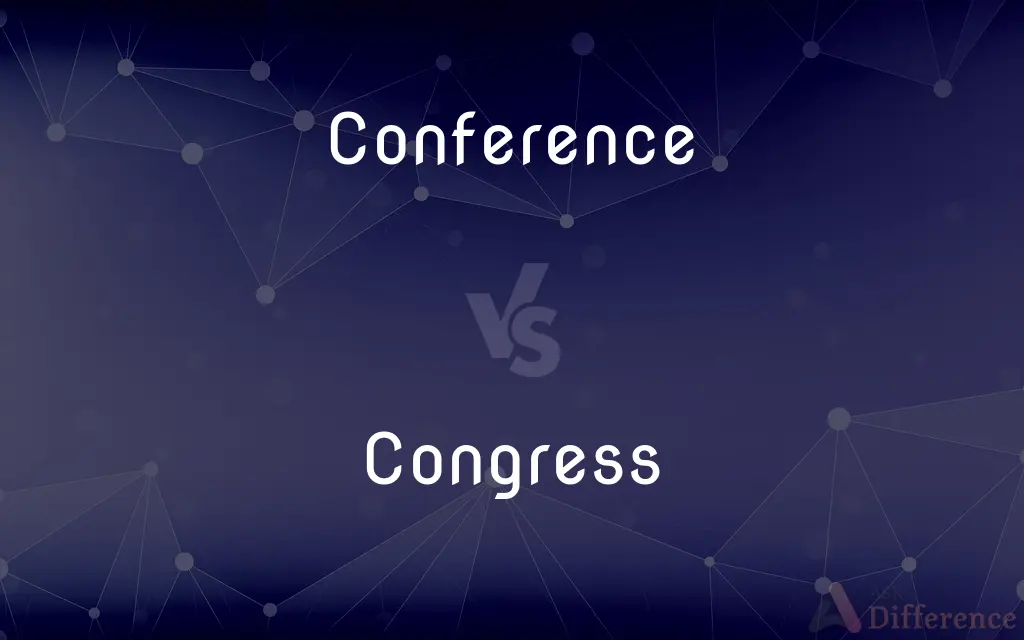Conference vs. Congress — What's the Difference?
Edited by Tayyaba Rehman — By Maham Liaqat — Updated on March 15, 2024
A conference is a gathering for discussion and networking within a specific field, while a congress often represents a formal meeting of representatives for decision-making purposes.

Difference Between Conference and Congress
Table of Contents
ADVERTISEMENT
Key Differences
Conferences are typically focused events where professionals, academics, or members of a specific community come together to share knowledge, research, and ideas, and to network with peers. These gatherings can range from small, niche workshops to large-scale international meetings, and they often include keynote speeches, panel discussions, and poster sessions. Congress, on the other hand, implies a more formal and structured gathering, often with the purpose of legislative decision-making or governance within a particular field or organization. It can refer to the legislative body of a government, such as the United States Congress, but in other contexts, it denotes a meeting of representatives from various countries or organizations convened to discuss and make decisions on specific issues.
The primary aim of conference is to disseminate information and foster collaboration among participants. Congresses may also feature discussions and presentations, but the focus is more on policy-making, elections, and official resolutions.
While conferences are generally open to anyone who registers or is invited, congresses might have more restricted participation, limited to elected officials, appointed delegates, or members of certain organizations. This exclusivity is because the outcomes of congresses often involve formal votes or decisions that affect the governing directions of the hosting body or its constituents.
Both conferences and congresses play crucial roles in their respective domains, offering platforms for sharing knowledge, debating issues, and making decisions. However, the level of formality, the intended audience, and the outcomes differentiate a conference from a congress. Conferences tend to emphasize knowledge exchange and professional development, whereas congresses focus on governance, policy-making, and organizational decisions.
The organization and frequency of these events can also vary. Conferences might be annual, biennial, or irregular, depending on the organizing body's goals and the field's dynamism. Congresses, especially those related to governmental or organizational governance, may follow a more regular schedule, dictated by statutes or bylaws, to ensure consistent oversight and decision-making processes.
ADVERTISEMENT
Comparison Chart
Purpose
Knowledge sharing, networking
Decision-making, governance
Participants
Professionals, academics, general public
Representatives, elected officials, delegates
Focus
Presentations, workshops, discussions
Legislation, policy, formal resolutions
Accessibility
Generally open through registration
Restricted to members or elected officials
Outcomes
Collaboration, publication of findings
Legal decisions, policy formulation
Compare with Definitions
Conference
Strengthens ties within professional communities.
Annual conferences are pivotal for the academic community's cohesion.
Congress
Involves delegates or officials.
Delegates from 50 countries attended the international congress on climate change.
Conference
Showcases new findings and innovations.
Researchers presented their latest studies in renewable energy at the conference.
Congress
Oversees the direction of organizations.
The annual congress of the association elects its new board members.
Conference
A venue for learning and exchanging ideas.
She attended a marketing conference to learn about the latest trends.
Congress
Focuses on lawmaking and governance.
The national congress convened to debate new health care legislation.
Conference
Includes keynotes, panels, and workshops.
The technology conference featured hands-on coding workshops.
Congress
Holds power to make formal decisions.
The congress voted to implement stricter environmental regulations.
Conference
Facilitates connections within a field.
The conference offered networking events to meet industry leaders.
Congress
Aims to establish or change policies.
Resolutions passed at the congress will direct future policies on education.
Conference
A conference is a meeting of people who "confer" about a topic.
Congress
Congresses are formal meetings of the representatives of different countries, constituent states, organizations, trade unions, political parties or other groups. The term originated in Late Middle English to denote an encounter (meeting of adversaries) during battle, from the Latin congressus.
Conference
A dessert pear of a firm-fleshed variety.
Congress
A formal assembly of representatives, as of various nations, to discuss problems.
Conference
Take part in a conference or conference call
Video conferencing
Congress
The national legislative body of a nation, especially a republic.
Conference
A meeting for consultation or discussion.
Congress
The national legislative body of the United States, consisting of the Senate and the House of Representatives.
Conference
An exchange of views.
Congress
The two-year session of this legislature between elections of the House of Representatives.
Conference
A meeting of committees to settle differences between two legislative bodies.
Congress
The act of coming together or meeting.
Conference
An assembly of clerical or of clerical and lay members from a particular district in various Protestant churches.
Congress
A single meeting, as of a political party or other group.
Conference
(Sports) An association of teams.
Congress
(archaic) A coming together of two or more people; a meeting.
Conference
The act of conferring, as of an academic degree.
Congress
A formal gathering or assembly; a conference held to discuss or decide on a specific question.
Conference
The act of consulting together formally; serious conversation or discussion; interchange of views.
Congress
A legislative body of a state, originally the bicameral legislature of the United States of America.
Conference
(politics) A multilateral diplomatic negotiation.
Congress
An association, especially one consisting of other associations or representatives of interest groups.
The National Congress of American Indians
Conference
(science) A formal event where scientists present their research results in speeches, workshops, posters or by other means.
Congress
(intransitive) To assemble together.
Conference
(business) An event organized by a for-profit or non-profit organization to discuss a pressing issue, such as a new product, market trend or government regulation, with a range of speakers.
Congress
To meet in a congress.
Conference
(sports) A group of sports teams that play each other on a regular basis.
Congress
A meeting of individuals, whether friendly or hostile; an encounter.
Here Pallas urges on, and Lausus there;Their congress in the field great Jove withstands.
Conference
A constituent tournament of a sports league in a given season.
Congress
A sudden encounter; a collision; a shock; - said of things.
From these laws may be deduced the rules of the congresses and reflections of two bodies.
Conference
(obsolete) The act of comparing two or more things together; comparison.
Congress
A gathering or assembly; a conference.
Conference
(Methodist Church) A stated meeting of preachers and others, invested with authority to take cognizance of ecclesiastical matters.
Congress
A formal assembly, as of princes, deputies, representatives, envoys, or commissioners; esp., a meeting of the representatives of several governments or societies to consider and determine matters of common interest.
The European powers strove to . . . accommodate their differences at the congress of Vienna.
Conference
A voluntary association of Congregational churches of a district; the district in which such churches are.
Congress
The collective body of senators and representatives of the people of a nation, esp. of a republic, constituting the chief legislative body of the nation.
Conference
To assess (a student) by one-on-one conversation, rather than an examination.
Congress
The lower house of the Spanish Cortes, the members of which are elected for three years.
Conference
The act of comparing two or more things together; comparison.
Helps and furtherances which . . . the mutual conference of all men's collections and observations may afford.
Congress
The legislature of the United States government
Conference
The act of consulting together formally; serious conversation or discussion; interchange of views.
Nor with such free and friendly conferenceAs he hath used of old.
Congress
A meeting of elected or appointed representatives
Conference
A meeting for consultation, discussion, or an interchange of opinions.
Congress
A national legislative assembly
Conference
A meeting of the two branches of a legislature, by their committees, to adjust between them.
Conference
A stated meeting of preachers and others, invested with authority to take cognizance of ecclesiastical matters.
Conference
A voluntary association of Congregational churches of a district; the district in which such churches are.
Conference
A prearranged meeting for consultation or exchange of information or discussion (especially one with a formal agenda)
Conference
An association of sports teams that organizes matches for its members
Conference
A discussion among participants who have an agreed (serious) topic
Common Curiosities
Can anyone attend a conference or congress?
Conferences are generally open to anyone who registers or is invited, while congress participation might be restricted to specific members or officials.
How are the outcomes of conferences and congresses different?
Conference outcomes typically include collaboration and the publication of findings, while congress outcomes involve legal decisions and policy formulation.
Do conferences and congresses only happen in professional settings?
While often professional, they can also occur in academic, governmental, or organizational contexts, depending on the focus and audience.
How long do conferences and congresses typically last?
Conferences can last from one day to several days, depending on the scope and size of the event. Congresses might follow a similar range but can also have fixed durations dictated by governing rules or statutes.
Can the outcomes of a congress affect the general public?
Yes, especially when the congress pertains to governmental or legislative bodies, as decisions made can directly impact laws, policies, and societal norms. Organizational congresses might have a more limited impact, affecting members or stakeholders.
What is the main goal of a conference compared to a congress?
The main goal of a conference is knowledge sharing and networking, whereas a congress focuses on decision-making and governance.
Can a conference have decision-making sessions like a congress?
Some conferences may include decision-making elements, especially within professional organizations, but these are usually less formal than those of a congress.
What determines who can speak or present at a conference or congress?
At conferences, speakers are often selected based on submissions of research, proposals, or expertise in the field. In congresses, speakers are usually members, elected officials, or invited experts, depending on the agenda and rules of the organization.
Are the topics discussed at conferences and congresses predetermined?
Yes, both usually have predetermined agendas. Conferences call for papers or presentations on specific topics, while congresses have set agendas focusing on legislative, policy, or organizational issues to be addressed.
Is it common for conferences and congresses to be held virtually?
Yes, virtual or hybrid formats have become increasingly common for both conferences and congresses, especially following global trends towards digitalization and in response to travel restrictions or environmental concerns. This format allows wider participation without geographical constraints.
Share Your Discovery

Previous Comparison
Trisomy vs. Triploidy
Next Comparison
Resistance vs. ResistorAuthor Spotlight
Written by
Maham LiaqatEdited by
Tayyaba RehmanTayyaba Rehman is a distinguished writer, currently serving as a primary contributor to askdifference.com. As a researcher in semantics and etymology, Tayyaba's passion for the complexity of languages and their distinctions has found a perfect home on the platform. Tayyaba delves into the intricacies of language, distinguishing between commonly confused words and phrases, thereby providing clarity for readers worldwide.














































